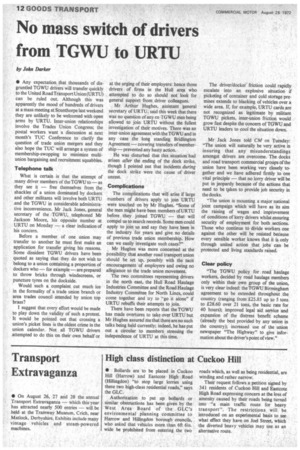No mass switch of drivers from TGWU to URTU
Page 14

If you've noticed an error in this article please click here to report it so we can fix it.
by John Darker
• Any expectation that thousands of disgruntled TGWU drivers will transfer quickly to the United Road TransportUnion(URTU) can be ruled out. Although this was apparently the mood of hundreds of drivers at a mass meeting at Scunthorpe last weekend they are unlikely to be welcomed with open arms by URTU. Inter-union relationships involve the Trades Union Congress; the postal workers want a discussion at next month's TUC Conference to clarify the question of trade union mergers and they also hope the TUC will arrange a system of membership-swopping to minimize multiunion bargaining and recruitment squabbles.
Telephone talk What is certain is that the attempt of many driver members of the TGWU to— as they see it — free themselves from the shackles of a union dominated by dockers and other militants will involve both URTU and the TGWU in considerable administrative inconvenience. Mr Jack Jones, general secretary of the TGWU, telephoned Mr Jackson Moore, his opposite number at URTU on Monday a clear indication of his concern.
Before a member of one union may transfer to another he must first make an application for transfer giving his reasons. Some dissident TGWU drivers have been quoted as saying that they do not wish to belong to a union containing a proportion of dockers who — for example— are prepared to throw bricks through windscreens, or puncture tyres on the dockside.
• Would such a complaint cut much ice in the formality of a trade union branch or area trades council attended by union top brass?
I suggest that every effort would be made to play down the validity of such a protest. It would be pointed out that crossing a union's picket lines is the oldest crime in the union calendar. Not all TGWU drivers attempted to do this on their own behalf or at the urging of their employers: hence those drivers of firms in the Hull area who attempted to do so should not look for general support from driver colleagues.
Mr Arthur Hughes, assistant general secretary of URTU, said this week that there was no question of any ex-TGWU men being allowed to join URTU without the fullest investigation of their motives. There was an inter-union agreement with the TGWU and in any case the long standing Bridlington Agreement — covering transfers of membership — prevented any hasty action.
He was disturbed that this situation had arisen after the ending of the dock strike, though I pointed out that incidents during the dock strike were the cause of driver unrest.
Complications The complications that will arise if large numbers of drivers apply to join URTU were touched on by Mr Hughes. "Some of the men might have been members of URTU before they joined TGWU — that will compel us to search records. Some men could apply to join us and say they have been in the industry for years and give no details of previous trade union membership. How can we easily investigate such cases?"
Mr Hughes was more concerned at the possibility that another road transport union should be set up, possibly with the tacit encouragement of employers and owing no allegiance to the trade union movement.
The two committees representing drivers in the north east, the Hull Road Haulage Industries Committee and the Road Haulage Industry Committee for North Lincs, could come together and try to "go it alone" if URTU rebuffs their attempts to join.
There have been reports that the TGWU has made overtures to take over URTU but Mr Hughes assured me that there are no such talks being held currently; indeed, he has put out a circular to members stressing the independence of URTU at this time. The driver/docker' friction could rapidly escalate into an explosive situation if picketing of container and cold statage premises extends to blacking of vehicles over a wide area. If, for example, URTU cards are not recognized as legitimate by militant TGWU pickets, inter-union friction would grow fast despite the concern of TGWU and URTU leaders to cool the situation down.
Mr Jack Jones told CM on Tuesday: "The union will naturally be very active in insuring that any misunderstandings amongst drivers are overcome. The docks and road transport commercial groups of the union have been working very closely together and we have adhered firmly to one vital principle — that no lorry driver will be put in jeopardy because of the actions that need to be taken to provide job security in the docks.
"The union is mounting a major national joint campaign which will have as its aim the raising of wages and improvement of conditions of lorry drivers whilst ensuring security of employment for both sections. Those who continue to divide workers one against the other will be resisted because every sensible worker knows that it is only through united action that jobs can be protected and living standards raised.
Clear policy "The TGWU policy for road haulage workers, decided by road haulage members only within their own group of the union, is very clear indeed: the TGWU Birmingham agreement to be extended throughout the country (ranging from £25.85 up to 5 tons to £28.60 over 21 tons, the basic rate for 40 hours); improved legal aid service and expansion of the distress benefit scheme (already the best provided by any union in the country); increased use of the union newspaper "The Highway" to give information about the driver's point of view."




















































































